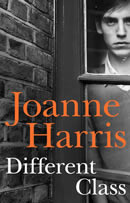Dear Reader,
Remember the scent of your old school? That blend of chalk dust, and mown grass, and polish, and cabbage, and teenage sweat? Remember on your first day, checking out the teachers, the other pupils; the classrooms? Remember how it seemed as if you’d never get used to the size of it, or the amount of homework, or the maze of corridors? Perhaps you were bullied. Perhaps you were shy. Perhaps you didn’t quite fit in. If so, you’ll know just what I’m talking about. Even murderers have to start somewhere.
In a previous life, before Chocolat, I taught French at a boys’ independent grammar school. I was there for fifteen years, and during that time, I collected enough stories to write a hundred books. A school is a stage on which tragedy and farce are never more than a moment away: a place in which every day, young lives are shaped, secrets shared, dramas enacted. And sometimes there’s something darker – unformed as yet, but waiting to grow.
Different Class is the third of a series of novels set in the fictional Northern town of Malbry. It follows on directly from Gentlemen and Players, revisiting St Oswald’s Grammar School (and most of the characters therein) a year after a series of distressing events, which culminated in murder. In narrative terms, it also precedes Blueeyedboy, which is set in the area around the school, and it features some of the main characters. So technically, this is a trilogy (I’ve always rather liked trilogies) although each story stands alone, and the books can be read in any order.
St Oswald’s Grammar School for Boys has been through some rough times over the past year. The murder of a schoolboy; the loss of the Head and several key members of staff, coupled with a disastrous set of exam results, have brought the place to the brink of ruin. Only a Crisis Intervention – designed to salvage failing schools – can save it now, which is why Roy Straitley, the eccentric Latin Master and main protagonist of Gentlemen and Players, is (not quite reluctantly) delaying his retirement for one more year. But a trendy new Head, a Crisis Team, a paper-free environment and a prospective merger with Mulberry House, St Oswald’s all-female counterpart, is only the start of a wave of change that promises to engulf him.
And when the Head turns out to be an ex-pupil of Straitley’s, the boy at the heart of a scandal that ended with a St Oswald’s master in jail, can Straitley’s loyalty survive, or, as he discovers the truth, will he find himself faced with the task of destroying the school he loves?

